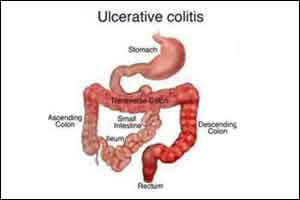- Home
- Editorial
- News
- Practice Guidelines
- Anesthesiology Guidelines
- Cancer Guidelines
- Cardiac Sciences Guidelines
- Critical Care Guidelines
- Dentistry Guidelines
- Dermatology Guidelines
- Diabetes and Endo Guidelines
- Diagnostics Guidelines
- ENT Guidelines
- Featured Practice Guidelines
- Gastroenterology Guidelines
- Geriatrics Guidelines
- Medicine Guidelines
- Nephrology Guidelines
- Neurosciences Guidelines
- Obs and Gynae Guidelines
- Ophthalmology Guidelines
- Orthopaedics Guidelines
- Paediatrics Guidelines
- Psychiatry Guidelines
- Pulmonology Guidelines
- Radiology Guidelines
- Surgery Guidelines
- Urology Guidelines
Electronic nose that can distinguish between Crohn's disease and ulcerative colitis

In much the same way as dogs can be trained to detect some diseases through their keen sense of smell, technology can help create electronic devices capable of performing this same task. This is precisely what a team of researchers from the Gandia campus of Valencia's Polytechnic University and the La Fe Health Investigation Institute have achieved, developing a prototype of an electronic nose that can distinguish between patients with Crohn's disease and ulcerative colitis.
The device -- named Moosy 32 eNose -can also tell whether the disease is active, with close to 90% accuracy. According to the researchers, 'in the future this type of equipment could be available for digestive system specialists who could, thanks to a simple stool analysis which takes three minutes, determine the state of the patient.'
Non-invasive detection
It is common nowadays to use invasive tests to diagnose and evaluate inflammatory activity as a result of colon-related illnesses, such as Crohn's disease and ulcerative colitis, both classified as inflammatory bowel diseases (IBD). With the developed prototype, the UPV and IIS La Fe teams want to contribute to the creation of non-invasive diagnosing systems. It is believed that as many as 200,000 people currently suffer from these illnesses in Spain and the rise in incidence continues to increase annually by over 3%.
The nose designed by the Valencian researchers can detect volatile organic compounds which act as diagnostic markers or to reveal the intensity level of the disease's activity. "Volatile organic compounds are created by physiological processes of the human body's metabolism and are expelled as waste through faeces. The concentration of these components can be a differentiating marker between certain bowel diseases and their accurate detection by way of non-invasive devices such as the electronic nose would be a great step forward for the detection and monitoring of the evolution of these diseases," explains doctor Pilar Nos, Head of the Digestive System Medicine Department at La Fe hospital.
Researchers have performed tests with 445 samples and have obtained positive results. "Results of the investigation are positive; however, it is paramount to continue working to improve the detection algorithms," adds José Pelegrí, who works for the Sensors and Magnetism group within the Gandia Campus Investigation Institute, IGIC.
The development of this prototype has been financed by Valencia's regional government. Moreover, the initial part of the project -- the study of the feasibility that led to establishing the bases of the system -- was financed by the Inbio, a scientific collaboration between the UPV and La Fe.
Taking part in the project are, as well as doctor Pilar Nos and professor José Pelegrí, doctor Belén Beltrán, head of the investigation laboratory of IBD for the Health Investigation Institute and the La Fe hospital, and Lluís Torse, nurse of the medical side of the project and Enric Climent, Juan Talens and Tomás Sogorb on behalf of the UPV's IGIC.
Other uses for the electronic nose
The system is being tested for further medical uses, such as detecting prostate cancer. Other studies, with positive results, are also being performed such as detecting the microbial contamination of water or determining the maturity level of fruit, which could have key applications within the agro-food industry.
Crohn's diseaseelectronic deviceselectronic noseinflammatory bowel diseasesprototypeulcerative colitis.
Next Story
NO DATA FOUND

Disclaimer: This site is primarily intended for healthcare professionals. Any content/information on this website does not replace the advice of medical and/or health professionals and should not be construed as medical/diagnostic advice/endorsement or prescription. Use of this site is subject to our terms of use, privacy policy, advertisement policy. © 2020 Minerva Medical Treatment Pvt Ltd